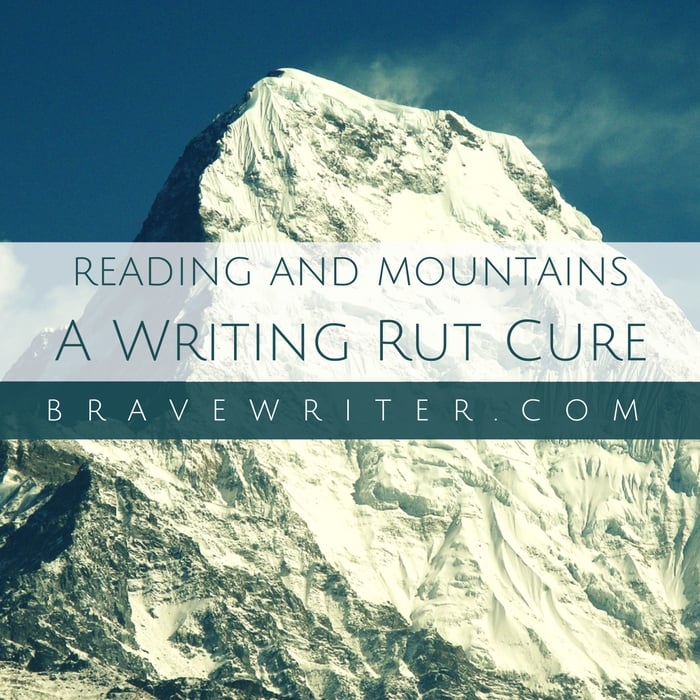My writing rut cure

Sometimes my writing bores… yawn…. me to…. yawn… what was I saying again?
It’s a lot like my cooking. I’m so sick of the same six meals I make every week (pizza, spaghetti, lentils, stir fry, pasta salad and black beans with rice), I can hardly eat them any more. When I’m invited to someone else’s house for a meal, I nearly lick the plate I’m so happy to be eating other flavors, prepared by other hands, using ingredients I never buy.
My writing can be like that. I know my little schtick. I introduce the anecdote, I correlate what I want to teach with a personal experience, I add some dialog or surprising detail.
Then I read someone else’s writing; someone I haven’t read in awhile and am startled to see it all done in a fresh way. There’s another way to write, one that weaves images, or piles up individual words without context, or tells someone else’s story, or litters her opening with fragments. It’s like a “get out of jail free” card when I run across writing that challenges my complacent status quo.
My favorite way to break out of my writing ruts is to read poetry.
Poets get a lot done in small spaces. They don’t have the luxury of another two pages to fix an overstatement or vague description. They’ve got to nail the insight in a couple of words. Song lyrics have this similar advantage (when they’re good, which often they aren’t).
My favorite poem to read and reread is by Wislawa Szymborska. It is translated from Polish so there is no rhyme in the English. The freshness of the metaphor combined with the directness of the images creates the poetry. More than that, though, more than craft or technique, this poem reminds me that there is no such thing as purity in life or art. It’s a chilly, lonely place on the mountain top. Life, in all its messiness and beauty, creativity and sharing, is worth living and appreciating on its own terms.
So since my writing is boring me today, I share with you writing that never fails to move me.
Notes from a Nonexistent Himalayan Expedition
So these are the Himalayas.
Mountains racing to the moon.
The moment of their start recorded
on the startling, ripped canvas of the sky.
Holes punched in a desert of clouds.
Thrust into nothing.
Echo; a white mute.
Quiet.
Yeti, down there we’ve got Wednesday,
bread and alphabets.
Two times two is four.
Roses are red there,
and violets are blue.
Yeti, crime is not all
we’re up to down there.
Yeti, not every sentence there
means death.
We’ve inherited hope
the gift of forgetting.
You’ll see how we give
birth among the ruins.
Yeti, we’ve got Shakespeare there.
Yeti, we play solitaire
and violin. At nightfall,
we turn lights on, Yeti.
Up here it’s neither moon nor earth.
Tears freeze.
Oh Yeti, semi-moonman,
turn back, think again!
I called this to the Yeti
inside four walls of avalanche,
stomping my feet for warmth
on the everlasting
snow.


















Or how about this? In the Nursing Home by Jane Kenyon:
She is like a horse grazing
a hill pasture that someone makes
smaller by coming in every night
to pull the fences in and in.
She has stopped running in wide loops
stopped even the tight circles.
She drops her head to feed; grass
is dust, and the creekbed’s dry.
Master, come with your light
halter. Come and bring her in.
Masterful, eh? This is in the collection, Otherwise.
Desiree
I love Jane Kenyon!
I was just reading her poem “Happiness” this morning. I love the one you cited. She really captures feelings in images so well.
Here is happiness:
There’s just no accounting for happiness,
or the way it turns up like a prodigal
who comes back to the dust at your feet
having squandered a fortune far away.
And how can you not forgive?
You make a feast in honor of what
was lost, and take from its place the finest
garment, which you saved for an occasion
you could not imagine, and you weep night and day
to know that you were not abandoned,
that happiness saved its most extreme form
for you alone.
No, happiness is the uncle you never
knew about, who flies a single-engine plane
onto the grassy landing strip, hitchhikes
into town, and inquires at every door
until he finds you asleep midafternoon
as you so often are during the unmerciful
hours of your despair.
It comes to the monk in his cell.
It comes to the woman sweeping the street
with a birch broom, to the child
whose mother has passed out from drink.
It comes to the lover, to the dog chewing
a sock, to the pusher, to the basket maker,
and to the clerk stacking cans of carrots
in the night.
It even comes to the boulder
in the perpetual shade of pine barrens,
to rain falling on the open sea,
to the wineglass, weary of holding wine.
I read her to feel good, in the gray days